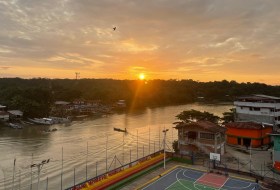News
Rural Energization Plan in Cauca reaches Guapi and Timbiquí
Social Interaction - Monday, December 5, 2022
The multidisciplinary research project led by the University of Cauca seeks to solve some of the problems in communities due to lack of access to energy.
The researchers of the Sustainable Rural Energization Plan of Cauca PERS Cauca held meetings from November 21 to 16 in Guapi with the Association of Women of Rosario ASOMUR and in Timbiquí where a meeting with the municipal mayor's office and a tour of the village of San Bernardo took place. . The project is led by the University of Cauca and financed by the Institute for Planning and Promotion of energy solutions for non-interconnected areas IPSE and the Mining-Energy Planning Unit UPME.
During the visit, the communities themselves heard about their energy needs and progress was made in the construction of joint projects that allow solutions to some of their problems due to lack of access to energy.
The PERS Cauca Projects team is designing an energy solution to improve the drying process of the rice produced by the women of ASOMUR in the village of El Rosario (Guapi); and proposing individual solar solutions for the inhabitants of the village of San Bernardo (Timbiquí). In these places, the communities have only four hours of energy a day in their homes. Also in the village of San Bernardo, alternatives are being sought to support the production process of "Viche", a high-quality ancestral drink in this region.
Professors Juliana Sarmiento and Claudia Escobar from the Department of Economic Sciences; Jairo Tocancipá from the Department of Anthropology and Maximiliano Bueno López from the Department of Electronics, Instrumentation and Control. PERS Cauca is a project that involves researchers from different faculties of the University of Cauca and promotes work between disciplines in search of reducing energy poverty and strengthening communities throughout the Department of Cauca.
Currently, within PERS Cauca, projects are being formulated in the municipalities of Patía, Caloto, Guapi and Timbiquí in order to seek financing in the different funds administered by the Ministry of Mines and Energy or through the General Royalty System.
More Info:


